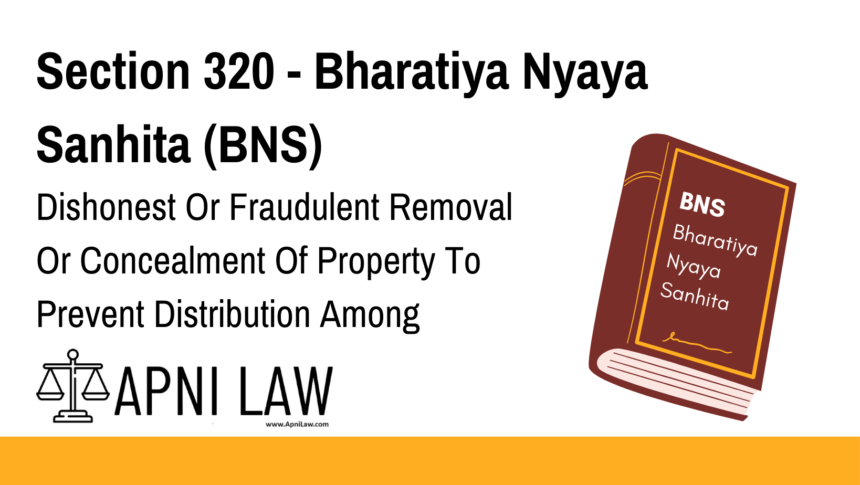Code: Section 320 BNS
Whoever dishonestly or fraudulently removes, conceals or delivers to any person,
or transfers or causes to be transferred to any person, without adequate consideration, any
property, intending thereby to prevent, or knowing it to be likely that he will thereby prevent,
the distribution of that property according to law among his creditors or the creditors of any
other person, shall be punished with imprisonment of either description for a term which
shall not be less than six months but which may extend to two years, or with fine, or with
both.
Explanation of Section 320 BNS
Section 320 of the Bharatiya Nyaya Sanhita (BNS) addresses fraudulent activities related to the removal, concealment, or transfer of property to prevent its proper distribution among creditors. This law aims to curb dishonesty in financial transactions, particularly in cases involving insolvency, bankruptcy, or debt recovery.
The key elements of the offense are:
- Dishonest or fraudulent intent: The action must be with the intention to deceive creditors.
- Transfer without adequate consideration: The property must be moved or concealed without receiving fair value in return.
- Prevention of lawful distribution: The act must hinder the legal process of distributing the property among creditors.
Illustration
Example 1: Concealing Assets to Evade Creditors
A businessman facing bankruptcy transfers valuable assets, including properties and vehicles, to a relative without proper consideration, intending to hide them from creditors. This act falls under Section 320 BNS.
Example 2: Fraudulent Property Transfer
A debtor sells his property to a friend at a nominal price to avoid paying debts. The intention behind this transaction is to prevent creditors from claiming the property. This is also punishable under Section 320.
Common Questions and Answers on Section 320 BNS
1. What does Section 320 BNS prohibit?
- Answer: It prohibits the dishonest or fraudulent transfer, concealment, or removal of property to prevent its legal distribution among creditors.
2. What is meant by “adequate consideration”?
- Answer: Adequate consideration refers to receiving fair value or compensation in return for the property. Transferring property without such consideration to evade creditors is considered fraudulent.
3. What are the punishments under Section 320 BNS?
- Answer: The offender can face imprisonment of at least six months (and up to two years), a fine, or both.
4. Does this law apply to individuals and companies?
- Answer: Yes, it applies to both individuals and entities like companies, especially in cases of financial fraud or insolvency proceedings.
Conclusion
Section 320 of the BNS plays a crucial role in ensuring fairness and transparency in financial transactions. It deters fraudulent practices aimed at evading creditors, thereby protecting the interests of those legally entitled to a share of the property. The stringent penalties act as a strong deterrent against such dishonest conduct.











